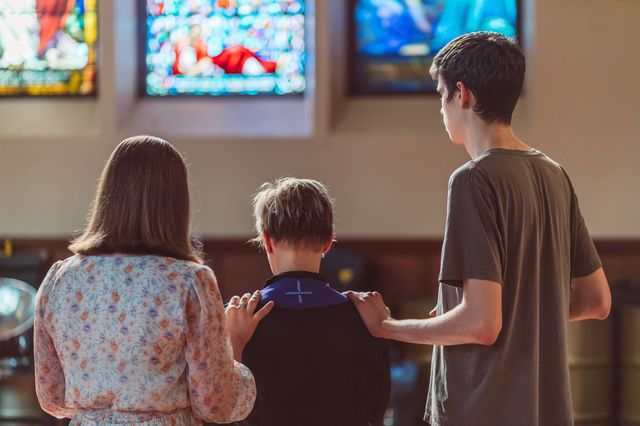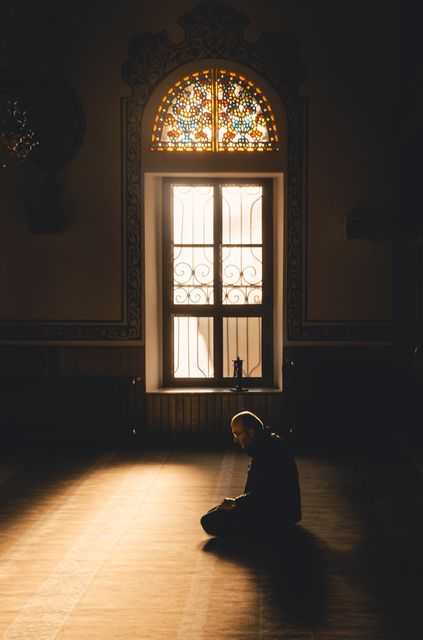The next day John again was standing with two of his disciples, and as he watched Jesus walk by, he exclaimed, “Look, here is the Lamb of God!” The two disciples heard him say this, and they followed Jesus. When Jesus turned and saw them following, he said to them, “What are you looking for?” They said to him, “Rabbi” (which translated means Teacher), “where are you staying?” He said to them, “Come and see.” They came and saw where he was staying, and they remained with him that day. John 1: 35-39
In his book, The Analogical Imagination, David Tracy describes how many classic texts have a “surplus of meaning.” With these texts, as you read them, you sense there are multiple layers of meaning. You sense the truth of the words as you read, and yet, another part of you knows that there is much more truth than what you have sensed in a single reading.
Certainly, the stories of scripture, as a classical religious text, can have this surplus of meaning, even if sometimes you miss it. You read a story that is the focus of a sermon or a Sunday school lesson. You get the point that the preacher or the teacher is trying to make. The lesson is taught, and the sermon is delivered. Perhaps it is days later when you realize the story is still there within you, speaking to you.
This story from John about Jesus’ encounter with two would-be disciples is one of those texts that resonate with that surplus of meaning every time I encounter it. In my most recent encounter with this story, I kept going back to the two simple statements of Jesus in his exchange with these men. He realizes that they are following him; their following seems hesitant and at a distance, but still, he senses they are there. And so he turns to them and asks, “What are you looking for?”
The response of the two men is not dishonest, but it does feel incomplete and enigmatic, “Rabbi, where are you staying?” Hey, when you’ve been discovered and confronted with your own confusing behavior, answering a question with another question is not a bad way to go. The exchange comes to an end with Jesus’ intriguing answer, “Come and see.”

From a place of surplus of meaning, one of the invitations of this delightful narrative is to move beyond simply studying it or investigating it. Maybe it’s better to let it bounce around inside of you. It’s better to play with the story in imaginative ways. So what follows is the result of that bouncing and that playing in me so far. I invite you to do the same with this text and with the words I share in response to this text.
“What are you looking for?”
At one level the question is a simple conversation starter. At another level, of course, it is a question that systems of philosophy and belief have been trying to answer for centuries.
It is an open-ended question; that is, there is no right or wrong answer. The only way you can have a wrong answer to this question is if you don’t give yourself, or the asker, an honest answer. Of course, that may be the struggle for many who hear it, because answering it honestly involves answering it fully and deeply. Knowing what you are really looking for means knowing who you really are.
Really knowing who you are means naming out loud, to yourself and to the one who asks the question, your wants, needs, desires, and yearnings. It means naming those places in you that inspire awe, wonder, and delight. It means naming those places in you that inspire struggle, doubt, despair, and disgust. It means living with the mystery of who you are. An honest answer to the question puts you on a journey that can be both inviting and scary. Which means it is probably a journey well-worth taking.
What are you looking for? It is easy to see this question as one we answer at the beginning of a faith journey. After all, that’s how it occurs in this story, at the beginning of Jesus’ ministry, at the beginning of John’s gospel. We ask the question, and, at some point, we go on with our lives because we feel like we have an answer, that we have a fairly clear picture or sense of what we are looking for. From that point on, well, life is about applying and living out this answer that we have discovered. We feel like the question has done its job, and so, we move on.
And yet, I wonder if there is some value in continuing to ask this question for the rest of our lives. Beyond just living out an initial answer, I wonder if it is in the life-long asking of this question, and the curious exploration it evokes, that we find the meaning and the purpose and the transformation that is the real journey of faith.
What are you looking for today, right now at this moment, right here in this place, at this time in your life? What are you looking for in your work? What are you looking for in this relationship? What are you looking for in your response to your yearnings and desires? What do your behaviors and your choices at this moment tell you about what you are looking for? What would it be like to make this question the focus of every moment of prayer and reflection for a day or a week? What would it be like to go to this question with regularity and with intent and with focus, and to see where that journey takes you?

What are you looking for? It seems to me that we can imagine this question coming to us in a couple of ways.
One, we can hear it as a general question, asked by the world around us. Two, we can hear it as a question, a good question, that we ask ourselves. When we hear it coming from out there or in here, it sets us on a journey of self-explorations and self- discovery. All in all, that’s not a bad thing.
But there is a third way, and I believe a more honest way, that we can imagine this question coming to us. What would it be like to hear this question as one posed to us by a living Jesus, by a living God? It feels like a very different experience, and it carries us to a very different place, because who asks us the question is just as important as the question itself.
When the question comes from out there, it is easy for the world to set the context in which we explore the answer. When the question comes from in here, it is easy for us to set the context in which we explore the answer. When the question comes from out there or in here, it is easier for us to set it aside when the search for an answer becomes a challenge or a struggle, when the search touches and stirs up something deep and basic within us.
But when it is a question that comes from the voice of another, from the voice of Jesus, from the voice of God, well, it isn’t as easy to shut it out and ignore it. Perhaps for a while, but then the voice speaks it again: What are you looking for? It shouldn’t be this hard, we protest. And yet, while not living with the question can free us from some struggle and challenge, it will also keep us from moments filled with a solid and powerful joy.
“Come and see.”
Like the first question, this simple statement can also be reduced to a simple invitation. But at another level, it is just as powerful and probing as “What are you looking for?”

Come and see. Most of us, and most parts of us, are okay with coming. In fact, we welcome it. “Come and be with me,” we hear Jesus, and the God whom Jesus proclaims, say. “Come and enjoy my presence and all the warm and inviting things my presence has to offer.” But it really is all about coming and seeing.
See the depths of your heart and soul and all the wonderful, inviting, amazing, and mysterious things that make up that depth. See the simple and the ordinary and the wonder they can inspire. See the way you order your life and how that order does or doesn’t fit with what you are looking for. See how the world, society, and culture influence the way you live your life.
See your hurts, struggles, and questions. See your wants, yearnings, and desires. See the mystery, and wonder of every person that crosses your path, from stranger to the one you love most deeply. Most importantly, come and see the life, the energy, the promise, the hope, and the spirit that God can give you as you come into God’s presence and really see.
The truth is we can come and be with Jesus and never really see any of these things. But not when we come and see. Like the question “What are you looking for?”, it matters who we hear offering this invitation to come and see. It is not an invitation that the world speaks to us or that we speak to ourselves. It is Jesus, it is God, who speaks this invitation. It is one thing to go deep inside ourselves, and try to see. It is another thing entirely to see ourselves in the inviting, steadying, and challenging presence of Jesus. It is another thing entirely to come and see in the presence of a living and vibrant God.
The story ends this way: They came and saw where he was staying, and they remained with him that day. They came. They saw. They remained. May we find ways to do those things as well.
